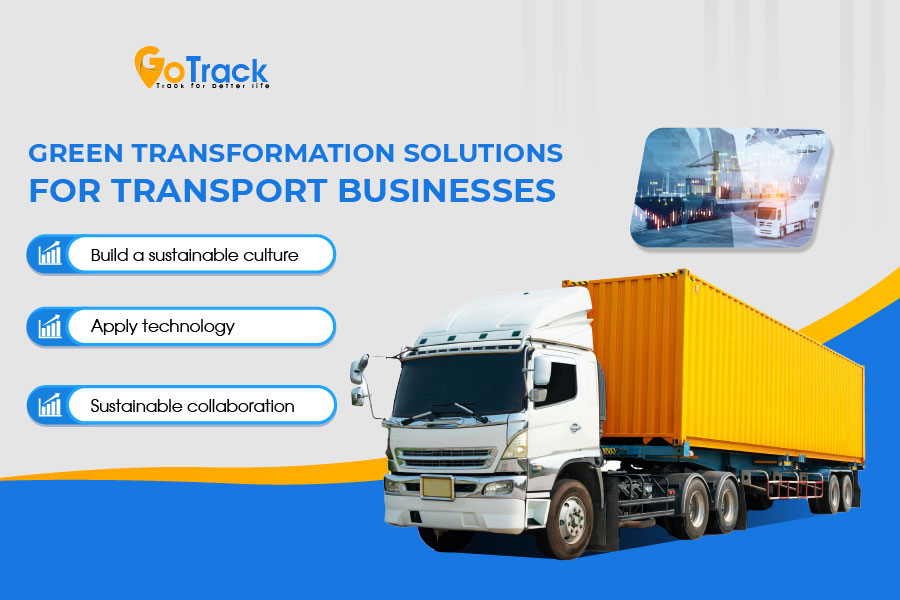Sustainable development is not just a passing trend but a necessity for companies in the transport industry. In addition to the significant benefits for the environment, community, and society, green transformation will help businesses optimize operational efficiency, reduce costs, and improve their brand image.
In the following article, GoTrack will share useful experiences and solutions to support transport companies in their journey towards adopting sustainable business models!
4 Steps to build sustainable development business models
Analyze the current situation and set goals
To build a green transformation plan, managers need to assess the company’s current state by considering factors such as: fuel consumption levels, emission levels, vehicle operation status, policies for employees and partners, etc.
Based on these evaluations, businesses can identify their strengths, weaknesses, opportunities, and challenges in the future. This allows managers to set clear, realistic, and measurable development goals for the business.
Build a green transformation strategy
Transport companies need to develop a comprehensive, detailed strategy that aligns with the identified goals. This includes determining the budget and financial capacity to cover transformation costs; identifying necessary technological, technical solutions, and vehicles; outlining policies and activities to implement; and assigning personnel roles in the green transformation process. A detailed strategy helps businesses prepare effectively before taking action, ensuring the success of subsequent phases.

Implement sustainable solutions
To achieve the best results, the strategy must be implemented systematically, adhering to the established plan and procedures. Measures and processes need to be followed in sequence, costs must be monitored and optimized, and any emerging issues that could affect performance or delay the transformation process should be minimized.
Measure, evaluate, and adjust
Regular monitoring, measurement, and evaluation during the implementation of green solutions help the company track progress and effectiveness. Managers should periodically check fuel consumption rates, CO2 emissions, fleet performance, and customer and partner feedback. Based on the results, businesses can identify problems that need addressing and quickly implement solutions to improve sustainability.
Sustainable development solutions for transport businesses
Build a sustainable development culture
To succeed in the green transformation model, transport businesses must first establish a sustainable corporate culture by setting policies that affirm the company’s responsibility towards environmental and social issues and actively participating in social activities.
Furthermore, it is crucial to ensure that employees are provided with a friendly working environment, including benefits, working conditions, and compensation, so they feel secure in their roles. Businesses can help employees better understand their goals and roles in building a sustainable company through workshops, events, or internal competitions. Additionally, companies can establish incentive policies to reward individuals and departments for energy-saving initiatives or waste reduction.

Apply technology to operations management
Analyze driving behavior: Modern tracking devices help transport companies monitor driving behavior, promptly identifying dangerous actions such as reckless driving, harsh braking, or speeding. This enables the company to take corrective measures, provide reminders, or offer driving skills training, ensuring driver safety and contributing to traffic safety.
Read more: GPS Tracking devices GT-S8
Optimize routes: Manual coordination and route optimization cannot achieve the desired efficiency, leading to reduced productivity and waste. With the help of tracking devices, businesses can coordinate vehicles effectively and optimize routes, reducing travel distances, saving fuel, lowering costs, and reducing emissions while avoiding traffic congestion during peak hours.
Optimize fuel costs: Monitoring fuel intake and consumption is crucial. Sensor devices can track and report real-time fuel consumption data for each vehicle and alert when abnormal fuel discharge occurs. Using software to track these data, managers can identify fuel consumption issues, adjust accordingly, and address leaks or prevent fuel theft.
Monitor emission levels: Transport companies need to monitor greenhouse gas emissions in accordance with legal regulations. Many software solutions now exist to help businesses track emission levels. Using the collected data, businesses can improve fuel efficiency, minimize greenhouse gas emissions, and ensure compliance with legal requirements.
Collaborate for sustainability
Companies can collaborate with partners, customers, and investors to share sustainable values throughout the green transformation journey. This helps establish a sustainable business network, working together to develop green solutions that benefit all parties and create positive values for the community.



